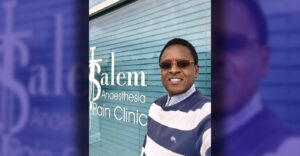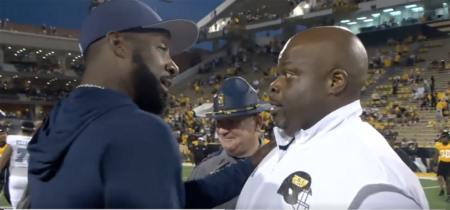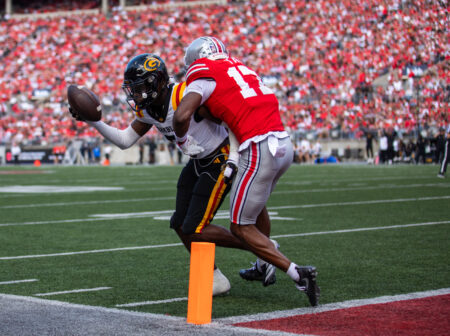Kina Collins grew up on the west side in Austin, and began organizing around gun violence while she was a student at Rufus M. Hitch Elementary and Von Steuben High School. In 2015, she began organizing with the protest movement that coalesced around the murder of 17-year-old Laquan McDonald by then-Chicago police officer Jason Van Dyke. Collins also worked with the Center for American Progress and Physicians for a National Health Program. In 2020, she challenged U.S. representative Danny K. Davis, who has represented the Illinois Seventh District since 1997, and garnered 14 percent of the vote in a four-way race that Davis won handily. Collins is running again, with gun violence prevention, health-care access, and criminal justice reform central to her campaign. This interview has been edited for length and clarity.
Jim Daley: What have you been working on since the 2020 race?
Kina Collins: I became the executive director for one of the largest gun-violence prevention nonprofits in the state. It was formerly known as the Illinois Council Against Handgun Violence, and is now One Aim Illinois. It has a statewide grassroots coalition, and we were pushing for things like removing firearms from the homes of domestic abusers and the gun dealer certification and licensing program here in Illinois. Because of that work, I was tapped by the Biden-Harris administration to serve as a stakeholder for the Gun Violence Prevention Task Force.
The pandemic exposed a lot of the issues that progressives have been fighting for around wage equity, access to health care, and listening to survivors of domestic violence and sexual assault. So a lot of my time since the last primary has been doing mutual aid across the district, checking in with folks to see if there’s any way we can plug them into resources.
Why do you think we’re in a new moment for gun-violence survivors and advocates from Chicago to be elected to Congress?
Nationally, Chicago has consistently been used as a political punching bag around this issue, but we’re not talking about the root causes. We deal with everyday gun violence here in the city of Chicago. And the root cause of everyday gun violence is poverty. Until we begin to address structural violence, which includes public school shutdowns, lead in our piping, abandoned buildings, vacant lots, food deserts, and a lack of jobs in these areas, we can’t strike at the heart of the root cause of what we’re experiencing here in Chicago.
I think that it’s time for Chicago’s congressional delegation to push back on conservative talking points that say Chicago is just an epicenter of violence. We don’t have a single gun store or a shooting range in the city. Chicago is not spreading gun violence across the country. However, red states are spreading gun violence to the city of Chicago. Sixty percent of the guns recovered in crimes in Chicago can be linked back to other states, primarily Indiana, Wisconsin, and Mississippi. The other 40 percent of guns can be linked back to gun shops in the suburbs of Illinois.
My stance is very clear: I support the Second Amendment and the right to legally obtain and own guns. However, my job as a gun-violence prevention advocate is to keep guns out of the hands of people who can harm themselves and harm the public. One of the ways that we’ve been able to do that is through red flag laws, and there’s overwhelming public support for universal background checks. So the messaging is the same.
Why are gun violence, access to health care, and criminal justice reform all part of your platform?
We don’t live single-issue lives—a lot of this stuff is interconnected. I think that our district serves as a microcosm of the United States. We have the Gold Coast and we have the west side of Chicago; we have the western suburbs and the south side. When we look at the disparate impacts and outcomes that happen across the district, we have the wealthiest of the wealthy and some of the most working-class communities in our district. All of them are interconnected.
In Chicago, practically all of our mental health services have been eviscerated. When mass shootings happen and the talking point is that the shooter had a mental health issue, I take umbrage with that, because people who suffer from mental illness are stigmatized around the issue of violence, when actually those who suffer from mental illness experience more violence than they commit. And if that is the case, and that’s your talking point, why do we not have universal health care as a preventative measure for that?
The more brushes with the law that you have, the more likely you are to become a homicide victim. In a district where we see places like Austin, and $100 million being spent by our government to incarcerate adults for mostly nonviolent offenses, we know that poverty is a policy choice that’s being made. That $100 million should be invested in true prevention, and that prevention looks like housing, education, and a fortified and strong local economy.
What are some issues that resonate with a wealthy white Gold Coast voter as much as a young Black man in Austin?
From Westchester all the way to West Englewood, everybody is concerned about public safety and crime. They’re concerned about gun violence. And they’re concerned about very urgent crises, like climate change, a livable wage, and student loan debt.
But people want to know, can we elect a representative who is not going to take corporate PAC money from companies like BP, Exxon Mobil, and Amazon, which are not geared towards the upliftment and the betterment of our district? And the answer is yes. We’ve been able to out-fundraise the incumbent without taking a dime of corporate PAC money. And that makes it easy for me to walk into Congress with a clear moral authority to hold major corporations to account.
How is this race different from 2020?
The pandemic changed a lot of things. Last time, I put a very strong focus on Medicare for All and health care, and it just so happened that our primary was the week before the entire globe basically shut down. And after that happened, I heard from constituents from all across the district who said, “Kina, you were talking about this, you were talking about full access to health care,” and how these issues play a role. So I think that the pandemic really validated me and a lot of voters’ eyes.
Also, we’ve been able to consolidate the progressive space here in the district and on the national level. And I think that we really make the case not just to progressives, but to everyday people across this district that failed status-quo leadership and the same things that we’ve been doing are not going to cut it. We have two options: we can vote for the district as it currently stands, or we can fight for the district that we should have. And I think we’re gonna prevail on June 28.
We need money for schools, after-school programs, and mental health to change the status quo.
The veteran politician tells stories of his childhood during an appearance before the City Club.
A Sharecropper’s Son Searches for Common Ground








